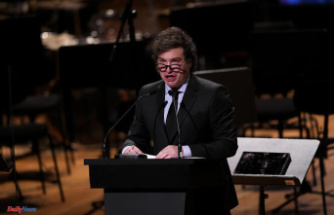The international drug trafficking trial of former Honduran President Juan Orlando Hernandez, which began on Tuesday February 20 in New York, could help reveal the underbelly of power in this Central American state.
Juan Orlando Hernandez, nicknamed JOH, extradited from Honduras to the United States at the end of his presidency (2014-2022), is on trial in Manhattan federal court for the smuggling of 500 tons of cocaine between 2004 and 2022. In exchange, according to New York prosecutors, JOH would have received millions of dollars in bribes from drug cartels, notably from the famous Mexican drug trafficker Joaquin “El Chapo” Guzman, sentenced to life imprisonment by the American courts in 2019 and imprisoned since then in a high security prison.
At the court stand on Thursday, a prosecution witness, the former mayor of El Paraiso de Copan, a small Honduran town, Alexander Ardon, explained how money from drug trafficking made it possible to buy votes for winning town halls, seats in the National Congress (Parliament) and even the presidency of Honduras.
He faces life imprisonment
Mr. Ardon, a former right-hand man of “El Chapo” Guzman and already convicted in the United States, said he met around 2008 Porfirio Lobo – who was to become president of Honduras in 2010 – who allegedly asked him for “2 million dollars » in exchange for protection. “I sent him 1 million home” after this meeting and then the rest later, according to this witness.
“Don Pepe [Porfirio Lobo] told me that if he won the elections, he would name Juan Orlando president of Congress,” which was the case from 2010 to 2014. Mr. Lobo served as the country's president until 2014 and Mr. Hernandez succeeded him from 2014 to 2022. Mr. Ardon explained that he obtained votes from deputies in favor of Mr. Hernandez at the time by “financing part of [their] campaign (…) with the money drug trafficking.”
For this trial postponed several times since his extradition, Juan Orlando Hernandez, 55, appears detained and alone in the courtroom since his two co-defendants, the former Honduran police chief Juan Carlos “Tigre” Bonilla and a former police officer, Mauricio Hernandez, pleaded guilty in order to cooperate with justice and avoid trial.
If convicted of all three charges – conspiracy to traffic drugs, trafficking and possession of weapons – Mr. Hernandez could be sentenced to life in prison, like his brother Tony Hernandez in 2021 and the latter's collaborator, Geovanny Fuentes, involved in the same network.
“Here’s your narco-president.”
In front of the courthouse in New York, a group of around twenty Hondurans demonstrated on Tuesday at the opening of the trial, to demand that the former head of state end his days behind bars. “Here is your narco-president,” they chanted.
Juan Orlando Hernandez says he is “innocent” and has repeatedly claimed that he was the victim of “revenge by the cartels, a plot orchestrated so that no government will ever resist them again”. A thesis that he again supported in a text posted Monday by his wife, Ana Garcia, on the X platform. In this message addressed to the Honduran people, he describes the accusations as “unjust” and “ filled with lies based on the testimonies of declared drug traffickers” who want to obtain clemency from the American justice system.
As president, he worked closely with former US President Donald Trump's administration, earning praise from Washington for drug busts and the fight against organized crime. For US federal prosecutors, JOH had in fact become a drug trafficker and had transformed his small Central American country into a “narco-state” with the help of military, police and civilians.
His indictment in New York also accuses him of having enriched himself with drug money, of having financed his electoral campaigns and of having engaged in fraud during the 2013 and 2017 elections. A conviction would make him join other former Latin American leaders tried and convicted in the United States, such as Panamanian Manuel Noriega in 1992 and Guatemalan Alfonso Portillo in 2014. In 2023, Mexico's former drug enforcement official, former minister Genaro Garcia Luna, was found guilty in New York of drug trafficking. His prison sentence will be handed down on June 24.












